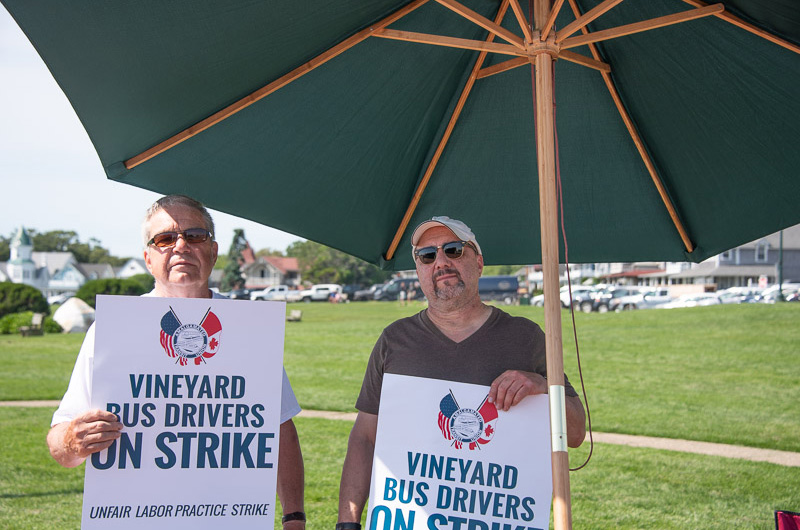Bus drivers for the Vineyard Transit Authority entered their second week on strike Friday, with no clear end in sight. Rounding the corner into a busy Fourth of July weekend, the transit system is set to jump into its peak months.
Short-term drivers have been hired to replace those out on strike and service is expected to return to 100 per cent, the VTA said on its website.
Amalgamated Transit Union (ATU), the union that represents the drivers, and Transit Connection Inc. (TCI), the management company that operates the buses, have been in contact with a federal mediator in an attempt to find common ground over wages, seniority perks, safety regulations, and other issues.

The ATU said Wednesday that the union has offered to enter into interest arbitration with TCI, “in an effort to bring a swift and just end to the five-year-long dispute.” In interest arbitration, an arbitrator is brought in to settle an impasse.
“If they [TCI] agree to interest arbitration then we will end the strike immediately,” said Steve MacDougall, the ATU spokesman, adding that TCI indicated to the union that it was hesitant to accept the offer.
The two groups have been stalled in contract negotiations for almost a year. The drivers voted to strike a month ago, but said they held out until last Friday in hopes of reaching a settlement with TCI. As of Thursday this week, 21 full-time drivers were on strike.
Picket lines were staged each day at the Steamship Authority terminals in Vineyard Haven and Oak Bluffs, in addition to the Church street bus stop in Edgartown. State Rep. Dylan Fernandes joined the picket line Wednesday to show his support. Senators Elizabeth Warren and Ed Markey and Cong. Bill Keating have also continued to support the drivers throughout the strike.
“We can’t afford this,” said VTA driver Katherine Kavanagh, referencing the time drivers have prepared to go without a paycheck. “But we can’t afford to go on living with the . . . wages they offer,” she added.
Richard Townes, a leading spokesman for the striking VTA drivers, said: “We will continue to strike until we reach an agreement.”
Replacement drivers hired by TCI have been brought in from out of state. According to VTA administrator Angela Grant, there are 10 replacement drivers hired from a Virginia-based company called EMSTAT.
The striking drivers have referred to the replacement driver company as a “scab-herding firm,” and are frustrated by what they say are management’s efforts to weaken their position by recruiting off-Island labor.
Bruce Hamilton, ATU vice president, said that in his experience he knows replacement workers come at a high price.
“Instead of the drivers who live, work, and pay taxes on the Island, they [TCI] are paying a huge premium for people to come and replace them,” he said.
Mr. Hamilton clarified that the paychecks issued by TCI are reimbursed by the VTA, which receives the bulk of its funding from local, state and federal funds. According to VTA financial statements posted on its website, ridership revenue accounted for about 20 per cent of its combined annual capital and operating budget last year.
When asked why replacement drivers were hired, Ms. Grant responded: “We are just trying to do whatever we can to keep service open.”
Greg Dash, labor relations consultant for TCI, had another take.
“When you pay for transportation from Virginia to Massachusetts, it’s a one-time cost,” he said. “When you give a wage increase its a cost in perpetuity.”
In early June, Ms. Grant sent an email to the VTA board and various state and local officials with a spreadsheet containing what she called TCI’s “best and final offer” — wage increases between about 8.5 per cent and nearly 19.5 per cent in the first year of the contract.
Over the course of the contract, cumulative raises would range from more than 15 per cent to nearly 26 per cent. Family health insurance would now be available, she said.
Under that proposal, hourly wages for first-year drivers would increase from $16.50 per hour to $19.50 per hour in the contract’s first year, with one per cent increases during each of the next three years. For drivers with the most seniority, the top rate would go to $25.50 in the first contract year, with two per cent increases each year after that.
In order to fund the TCI offer, the transit authority would need to increase fares by $225,000 and cut service by up to $335,000, according to the VTA analysis.
The drivers’ union has been asking for higher wage increases, better health benefits, seniority perks and safety standards.
As of late June, VTA drivers proposed a $19.50 hourly rate for first-year employees that can increase to $27.50 after the fifth year. After three contract years, the rate for five-plus year employees would increase to $29.17, under the drivers’ proposal.
According to a statement issued by the VTA, the drivers’ proposal would “implement a devastating service cut of 50 to 60 per cent,” an assertion the union disputed.
In her email to the board and others, Ms. Grant strongly countered claims by the union that TCI is holding back.
“The union is under the impression that our operating company is withholding available money, which is completely inaccurate,” she wrote. She said yearly management fees paid to TCI amount to about $100,000, and noted that the VTA financial data is available for public viewing.
Meanwhile, following a seven-hour meeting with the federal mediator on Monday, union officials said they hope the talks will yield a good result, sooner rather later.
“I’m not going to say it went smoothly,” said Mr. Hamilton. “But at least it’s moving.”







Comments (14)
Comments
Comment policy »